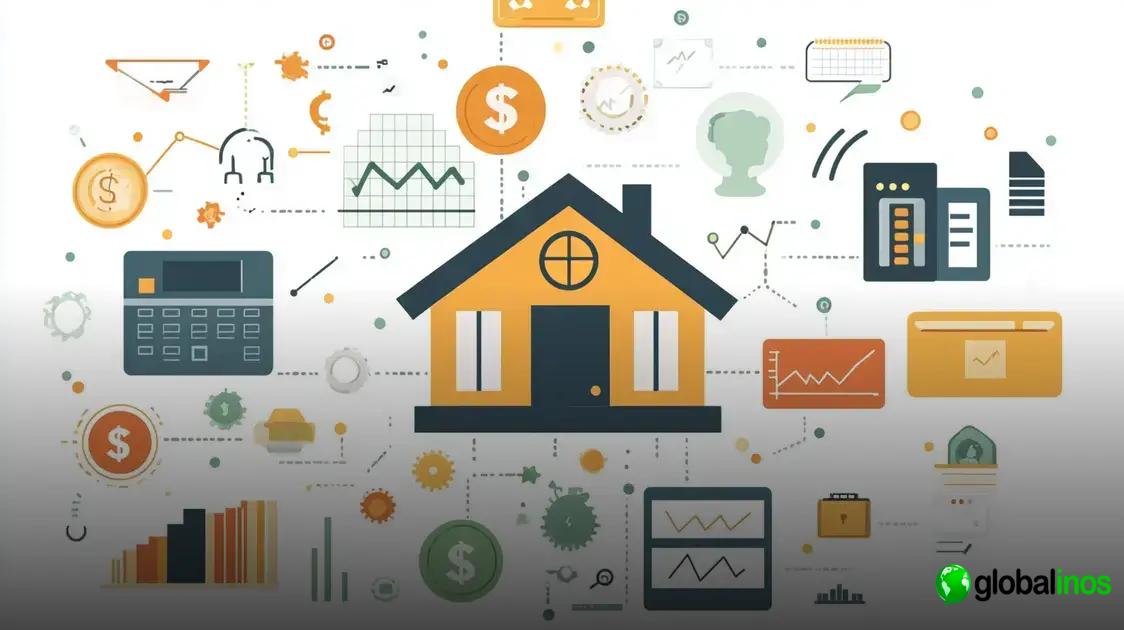Understanding mortgage rates is crucial when purchasing a home, as it directly impacts the overall cost of your loan. With so many options available, it can be overwhelming to find the best mortgage rates. However, knowing the factors that influence these rates can help you make an informed decision.
Mortgage rates are influenced by a variety of factors, including the economy, the central bank’s interest rates, and your credit score. By comparing rates from different lenders, you can secure the best deal for your home loan, potentially saving you thousands over the life of the mortgage.
Keep reading to discover tips and strategies to make sure you’re getting the most competitive rates for your mortgage.
Understanding Mortgage Rates
Understanding mortgage rates is vital for anyone looking to buy a home or refinance an existing mortgage. Mortgage rates are the interest rates charged on a mortgage loan. They play a significant role in determining how much money you will pay over the life of the loan. A lower interest rate can save you thousands of dollars.
What are Mortgage Rates?
Simply put, a mortgage rate is the cost of borrowing money to purchasing a home. The rate can fluctuate based on various factors, including economic conditions, the lender’s policies, and your personal financial profile.
Types of Mortgage Rates
There are primarily two types of mortgage rates: fixed-rate and adjustable-rate. A fixed-rate mortgage means your interest rate stays the same throughout the life of the loan, making monthly payments predictable. In contrast, an adjustable-rate mortgage (ARM) has rates that can change after an initial fixed period, which can lead to lower payments but also greater risk.
How are Mortgage Rates Determined?
Mortgage rates are tied to economic indicators such as inflation, employment rates, and the Federal Reserve’s interest rate decisions. When the economy is strong, rates tend to rise. Conversely, during a recession, rates may drop to stimulate borrowing. Personal factors like credit score and debt-to-income ratio also significantly influence the rates offered by lenders.
Why Rates Matter
The mortgage rate affects how much you pay each month and the overall amount you repay over time. Even a slight difference in rates can lead to significant savings in the long run, emphasizing the importance of finding the best mortgage rates available.
Where to Find Current Rates
Finding current mortgage rates can be done through various platforms, including bank websites, mortgage brokers, and dedicated financial advice sites. It’s essential to shop around and compare different offers to find the best deal suited to your financial situation.
How to Compare Mortgage Rates
Comparing mortgage rates can seem overwhelming, but it’s a crucial step to find the best deal for your home purchase. To effectively compare mortgage rates, follow these steps:
1. Gather Rate Quotes
Start by requesting quotes from multiple lenders. You can do this through banks, credit unions, or online mortgage lenders. Be sure to ask for the same loan type and terms for accuracy.
2. Look at the APR
The Annual Percentage Rate (APR) is a crucial factor. It includes not just the interest rate but also other fees and costs. This gives you a clearer picture of the total cost of the loan.
3. Check Loan Terms
Different loans may come with various terms, like 15 or 30 years. A shorter term typically has a lower interest rate, but the payments will be higher. Assess what works best for your budget.
4. Understand Fees
In addition to interest rates, investigate any associated fees. These might include origination fees, application fees, and closing costs. Ask for a breakdown of these fees to make an accurate comparison.
5. Review Interest Rate Locks
Consider whether lenders offer rate locks. This can protect you from rising rates while your loan is being processed. Understand how long the lock lasts and if there is a cost involved.
6. Use Online Tools
Online mortgage calculators and comparison tools can simplify the process. These tools help you visualize your monthly payments and overall costs based on different rates and terms.
7. Talk to a Mortgage Broker
A mortgage broker can also help you find the best rates. They know the market and can save you time by finding options that fit your needs.
8. Evaluate Your Financial Situation
Your credit score, income, and debts will affect the rates you are offered. Knowing your financial profile helps in assessing which offers are realistic for your situation.
Factors Affecting Mortgage Rates

Various factors can influence mortgage rates. Understanding these factors helps you make informed decisions when applying for a mortgage. Below are the key elements that affect mortgage rates:
1. Economic Conditions
The overall economy plays a major role in setting mortgage rates. When the economy is doing well, interest rates tend to rise. In contrast, during economic downturns, rates usually fall to encourage borrowing.
2. Inflation
Inflation affects purchasing power and influences interest rates. Higher inflation typically causes lenders to raise mortgage rates to compensate for the decrease in money value over time.
3. Federal Reserve Policies
The Federal Reserve sets the benchmark interest rate. Changes in this rate affect mortgage rates. When the Fed raises rates, mortgage rates often follow suit, making it more expensive to borrow money.
4. Your Credit Score
Your credit score is a major factor in determining your mortgage rate. A higher score usually leads to lower rates because lenders view you as a lower risk. Conversely, a lower credit score can result in higher rates.
5. Down Payment Amount
The size of your down payment can also impact your mortgage rate. Generally, a larger down payment reduces the lender’s risk and can lead to more favorable terms. Loans with less than 20% down may incur private mortgage insurance (PMI), increasing overall costs.
6. Loan Type
Different loan types come with various interest rates. For instance, fixed-rate loans often have higher rates than adjustable-rate mortgages (ARMs) initially. Be sure to understand the differences and choose the one that fits your needs.
7. Loan Term
The length of time you take to repay the mortgage can also affect the rate. Shorter-term loans generally have lower interest rates but higher monthly payments compared to longer-term loans.
8. Local Market Conditions
Finally, local real estate trends can play a role in mortgage rates. In competitive housing markets, rates may be higher due to demand. Understanding the local market can help you anticipate rate fluctuations.
Tips for Securing the Best Mortgage Rate
Securing the best mortgage rate is essential to save money in the long run. Here are some valuable tips to help you achieve this goal:
1. Improve Your Credit Score
Your credit score is a major factor in determining your mortgage rate. Pay off debts, make payments on time, and avoid opening new credit accounts to boost your score before applying.
2. Save for a Larger Down Payment
A larger down payment reduces the lender’s risk. Aim to save at least 20% of the home’s price to potentially lower your interest rate and avoid private mortgage insurance (PMI).
3. Shop Around for Lenders
Don’t settle for the first lender. Compare offers from multiple banks, credit unions, and mortgage companies. Each may have different rates and terms available.
4. Lock in Your Rate
Consider locking in your mortgage rate once you find a favorable offer. Rate locks can protect you from rising interest rates while your loan is processed.
5. Consider Different Loan Types
Explore various loan options, such as fixed-rate or adjustable-rate mortgages. A fixed-rate mortgage offers stability, while an ARM might offer lower initial rates.
6. Be Flexible with Your Loan Terms
Shorter loan terms typically have lower interest rates. Consider a 15-year mortgage instead of a 30-year mortgage if it fits your budget for overall savings.
7. Maintain a Steady Income
Lenders prefer borrowers with stable income. Avoid changing jobs before applying for a mortgage, as this can raise red flags and affect your approval chances.
8. Review Your Debt-to-Income Ratio
Your debt-to-income ratio measures how much of your income goes toward debt. Lowering this ratio can make you a more attractive borrower, which may lead to better rates.
Current Trends in Mortgage Rates
Currently, mortgage rates are influenced by various trends and factors in the economy. Staying informed about these trends can help you make better decisions regarding home financing.
1. Interest Rate Increases
In recent months, many lenders have been raising their interest rates due to the Federal Reserve’s policies. Higher rates can make loans more expensive, affecting how much you might pay monthly.
2. Economic Recovery
The economy is showing signs of recovery after recent downturns, leading to increased demand for homes. This demand can pressure rates upward, as more buyers compete for financing.
3. Inflation Concerns
Inflation continues to be a concern, as it affects buying power and, subsequently, mortgage rates. Higher inflation often leads to higher interest rates, reflecting the cost of living increases.
4. Strong Job Market
A strong job market generally implies more stability in home buying, leading lenders to respond by adjusting rates. More employment can mean more buyers entering the market.
5. Popularity of Fixed-Rate Mortgages
Many buyers are leaning towards fixed-rate mortgages for predictable payments amid rising costs. This trend is shifting demand and can contribute to rate changes.
6. Housing Supply and Demand
Limited inventory in real estate can drive higher prices and interest rates, as the available homes are often limited compared to the number of active buyers.
7. Technological Advances in Lending
Advancements in technology are changing how lenders operate. Online lenders may offer more competitive rates and simplified processes, benefiting savvy borrowers.
8. Seasonal Trends
Mortgage rates can also fluctuate seasonally. Typically, rates may lower in the winter when fewer people are buying homes, while spring and summer often see higher rates due to increased buying activity.
Improving Your Credit Score for Better Rates

Improving your credit score is essential for securing better mortgage rates. Here are proven strategies to help you enhance your score:
1. Check Your Credit Report
Start by reviewing your credit report for errors. You can obtain a free copy once a year from each of the major credit bureaus. Dispute any inaccuracies you find.
2. Pay Your Bills on Time
Your payment history significantly impacts your credit score. Make it a habit to pay all your bills on time, including credit cards, utilities, and loans.
3. Reduce Credit Card Balances
High credit card balances can lower your credit score. Aim to pay down debts to keep your credit utilization ratio below 30%. This ratio measures how much credit you are using compared to your total available credit.
4. Avoid New Credit Applications
Each time you apply for new credit, a hard inquiry is made, which can temporarily lower your score. Avoid applying for multiple credit cards or loans before seeking a mortgage.
5. Keep Old Accounts Open
The length of your credit history is important. Keep older credit accounts open to help increase your average account age. This can positively influence your score.
6. Diversify Your Credit Mix
Having a variety of credit types, such as credit cards, auto loans, and personal loans, can be beneficial. A diverse credit mix can improve your score, but only apply for credit types if you need them.
7. Set Up Alerts and Reminders
Use technology to your advantage by setting up payment reminders. Many banks and financial apps allow you to receive notifications before a payment is due.
8. Seek Professional Advice if Needed
If you struggle with improving your credit score, consider working with a credit counseling service. They can provide personalized advice and strategies tailored to your situation.
The Role of Down Payments in Interest Rates
The size of your down payment plays a crucial role in determining your interest rate. A larger down payment can lead to lower rates and greater savings.
1. Reduced Lender Risk
When you put more money down, it reduces the lender’s risk. A larger down payment means you have more equity in the home right away, which makes lenders more comfortable and willing to offer lower rates.
2. Avoiding Private Mortgage Insurance (PMI)
Generally, if your down payment is less than 20%, you may need to pay Private Mortgage Insurance (PMI). This added cost can increase your monthly payments, but a larger down payment can help you avoid it completely.
3. Better Loan Offers
With a significant down payment, lenders may offer you better loan terms. This includes not only lower interest rates but also reduced fees and more flexible repayment options.
4. Impact on Monthly Payments
A larger down payment means you are borrowing less money. This results in lower monthly payments, making your mortgage more affordable over time.
5. Improved Negotiation Power
When you can make a larger down payment, you can often negotiate better rates and terms. Lenders may cater more to buyers who demonstrate financial stability through sizable down payments.
6. Market Trends Influence
Current market trends can affect how much you need for a down payment. It’s important to stay updated on what lenders expect and adjust your savings goals accordingly.
7. Financial Preparedness
Making a larger down payment shows lenders you are financially prepared. It indicates responsible financial behavior, which can lead to better rates.
8. Long-Term Savings
Even though saving for a larger down payment can take time, it often results in long-term savings. Lower interest rates translate into significant savings over the life of the loan.
Finding the Right Lender for Your Needs
Finding the right lender is critical to securing the best mortgage for your needs. Here are some tips to help you choose wisely:
1. Evaluate Your Financial Situation
Before choosing a lender, assess your financial status. Consider your credit score, income, and how much you can afford for a down payment. This knowledge will help you find lenders that suit your situation.
2. Research Different Lenders
Take time to research various lenders. Explore local banks, credit unions, and online mortgage lenders. Each lender offers different rates and terms, so comparing them is important.
3. Read Online Reviews
Check customer reviews and ratings for lenders. Websites that offer consumer feedback can help you gauge the lender’s reputation and service quality.
4. Consider Loan Options
Different lenders may specialize in various types of loans. Whether you need a fixed-rate mortgage, adjustable-rate mortgage, or FHA loan, make sure your lender offers the options that match your needs.
5. Ask About Fees and Closing Costs
Inquire about all associated fees and closing costs upfront. Different lenders might have different charges, which can significantly affect the overall cost of your mortgage.
6. Look for Good Customer Service
Choose a lender that provides excellent customer service. You want to work with someone who is responsive and willing to answer your questions throughout the process.
7. Get Pre-Approved
Before shopping for homes, seek pre-approval from a few lenders. This process gives you a better idea of what you can afford and how much each lender is willing to lend you.
8. Compare Rates and Terms
Once you have offers from multiple lenders, compare their mortgage rates and terms side by side. Pay attention to the interest rates, loan lengths, and any special conditions they may have.
Check out our article on Instacredit Loan to discover how it works and whether it’s the right choice for your financial needs.





